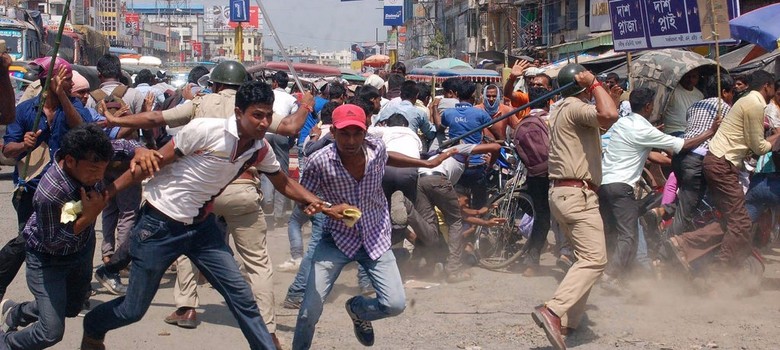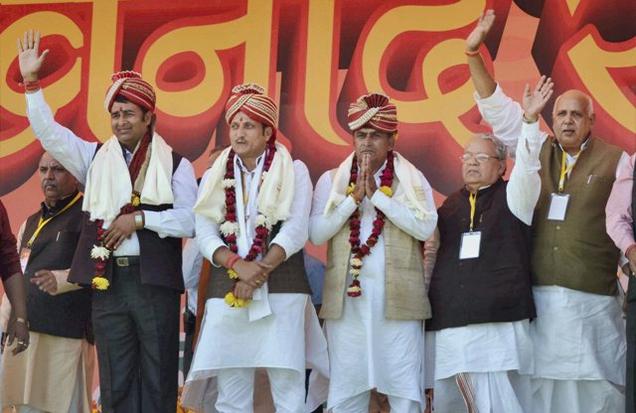The Justice Vishnu Sahai Commission report on the September 2013 Muzaffarnagar riots was tabled on the floor of the Uttar Pradesh (UP) State Assembly early this year. The Akhilesh Yadav-led government knew that in the forthcoming elections they would have to answer lot of difficult questions pertaining to the law order situation during his tenure especially with regard to the communal riots in Muzaffarnagar and then, the lynching to death of Mohammad Akhlaque at Dadri (2015).

Both these bouts of violence have had far reaching political impact for the Samajwadi Party's (SP’s) political fortunes specially when it's key opponent, the Bahujan Samaj Party (BSP) has an eye on the Samajwadi Party’s core vote base, that is Muslims; this collective vote base which at one time, almost blindly supported Mulayam Singh Yadav's SP has felt the deep and lasting scars of betrayal, since 2013.
There is a also debate within political circles in Lucknow and beyond, of how, deliberately, Akhilesh (the chief minister) has tried to cultivate an image which does not make him another "Mulla Akhilesh" as his father in the early 1990's. The prefix to his name in political circles, type-casts him, (if rather crudely) as pro-Muslim.
The Justice Sahai report on the Muzaffarnagar violence (2013) when made public had conclusions that were shocking: it completely absolved the state government and worse: the inquiry report said nothing about the key players who engineered the rioting and violence against the Muslim minority. The commission only held two police officers accountable for what the former judge found, predictably, an ‘intelligence failure’.
Akhilesh is today politically facing a dual challenge from within his family and also from his key support base which among Muslims. There is a distinct buzz amongst Muslims, especially in western UP, traditional Jat-land that in this election, support to any party is not guaranteed. Between the lines, this tentatively expressed sentiment could signal a shift the collective Muslim support base from the SP to the BSP, inspired by the fact that the BSP has consolidated its Dalit support base (that had declined to 19.5 per cent in 2014). This has been reflected in the large turnout of Dalits to BSP supremo, Mayawati’s rallies in Saharanpur, Agra, Azamgarh, Allahabad and Lucknow. Today, the BSP looks to be in a more formidable position to take on the BJP. As of today, Muslims will, in more likelihood, be voting for the formation that can put up a more realistic electoral battle against a resurgent BJP. This negative, (against the BJP) collective vote of the Muslim, however, also has the potential danger of consolidating the non-Dalit Hindu vote in favour of the BJP.

मुजफ्फरनगर दंगो के आरोपी संगीत सोम व सुरेश राणा को मोदी की रैली में सम्मानित किया गया।
Eventually, however, the issue of communal riots and justice to the victims (survivors) which is the reason for this substantial political turnaround will remain unaddressed. I have been going through text of reports of different commissions of enquiry established post communal riots in different parts of the country. Key principles of equality and non-discrimination, enshrined in the Universal Declaration of Human Rights (UDHR) are echoed and find space in the Indian Constitution. India is a signatory to the UDHR. The UDHR, under Article 2 provides for rights without discrimination, without restriction of any kind based on race, language or religion etc.; Article 7 provides for equality before law and to the equal protection of the law for all; Article 8 postulates the availability of an effective remedy in law for acts violating the fundamental rights guaranteed to an individual and Article 12 provides for the right to a fair trial. These rights are enshrined in Articles 14 and 21 of the Constitution of India.
Yet, little has happened vis a vis the delivery of justice to riot victims except politicking by our political class to reap benefits out of such dastardly acts. Can it be said in all honesty that the investigation and prosecution in matters relating to communal riots which is really based on protecting human dignity and the right to life, are in accordance with the above, lofty legal principles?
These questions posed must of necessity give cause for deep introspection. Thus, the Justice Sahai report will be a much-discussed document in the coming UP elections, but only for vote-gathering. Sad, but true.
(The author is Director, Centre for Objective Research and Development [CORD], Lucknow)